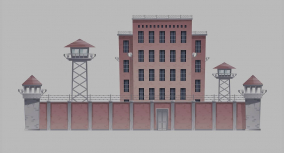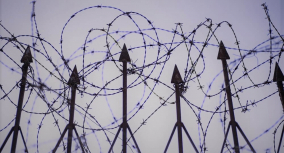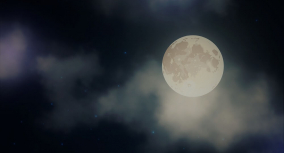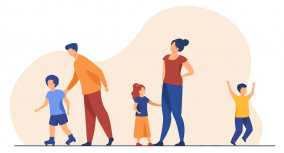Characters in Night by Elie Wiesel impress the readers with their multifaceted natures and dramatic fates. Throughout the storyline in Night, the characters live through the horrifying events and sufferings the Jewish people faced during the Holocaust.
In this article, our custom-writing experts will discuss all characters in Night by Elie Wiesel, including:
- Eliezer, the protagonist
- Shlomo, Night‘s second most important character
- Moishe the Beadle
- Franek
In Night, these characters are crucial for understanding the author’s message about peace and humanism. Read this guide to the end to learn all about Eliezer, Shlomo, Dr Mengele, and others – with prominent quotes from Night.
Important Characters in Night by Elie Wiesel
- Eliezer is one of the very few Holocaust survivors and the main character of the Night.
- Eliezer’s father, Shlomo, is a well-liked member of the Sighet Jewish community. Throughout the book, Eliezer and his father’s narrative unfolds and comes to a dramatic conclusion.
- Moshe the Beadle is a Jewish immigrant who taught Eliezer. He was the first victim of the Nazis in the book.
- Madame Schächter is a Jewish woman from Sighet. When Madame Schächter cries every night that she sees furnaces in the distance, people assume she is insane. But as the trains soon arrive at the Auschwitz crematoria, she turns out to be a prophetess.
- Juliek and Eliezer become friends at Auschwitz. Late in the memoir, Juliek reappears when Eliezer hears him practicing the violin following the death march to Gleiwitz.
- Idek is Eliezer’s Kapo, a Nazi-conscripted prisoner assigned to guard duty. Many Kapos treated the inmates just as cruelly as the Germans did, even though they, too, had to deal with the brutality of the Nazis.
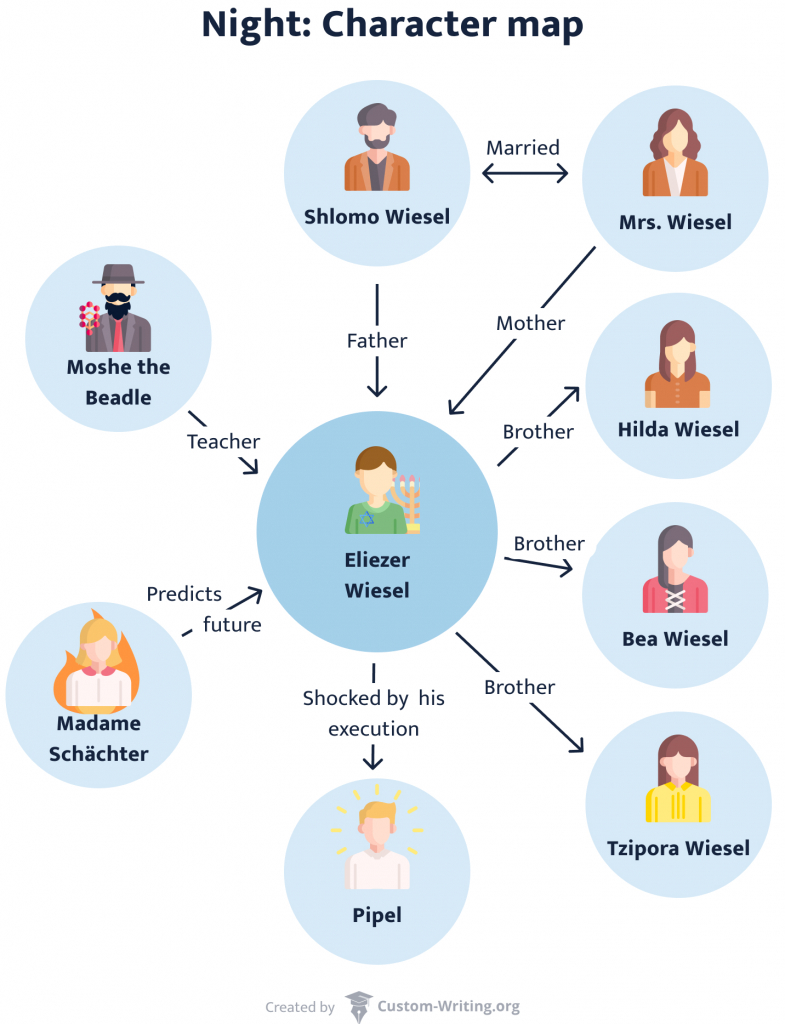
Main Character in Night: Eliezer Wiesel
Eliezer is the book’s central character, the narrator, and one of the very few Holocaust survivors. Since Night is a semi-fictional memoir, he is also the author’s prototype.
Elie is the only son in a Jews family from the small town of Sighet. At the beginning of the story, he is a profoundly religious and well-behaved boy. He spends hours studying Torah with his teacher – Moché the Beadle, who he highly respects. However, his personality changes throughout the book. Witnessing the horrifying events of the Holocaust, Elie loses his faith in God and becomes rude and cold. Yet, he remains devoted to his father till the very end.
Elie Wiesel Character Traits
Here’s how Eliezer’s character develops throughout the novel:
- He is practically a child at the start of the book. In addition, he is a devout Jew who dedicates his days to studying the Talmud and his nights to Kabbalah.
- Eliezer faces the worst aspects of both himself and humanity at the age of 15. The concentration camp inmates exhibit their worst traits as a result of being kept in conditions where they are almost famished and subjected to physical and psychological abuse. Most turn inward, thinking only of how to keep themselves alive. Eliezer faces this aspect of his personality as well.
- By the end of the book, Eliezer is still unsure about his faith. He is no longer devout but is moving toward challenging God in order to grow closer to Him.
- The final image of Eliezer is a corpse that he sees in the mirror. Despite being free, his terrible experience has left him scarred.
In the end, his identity has been irrevocably changed. Eliezer is no longer a child due to the atrocities he has seen and the dark side of himself he has discovered. He is also no longer a son due to the deaths of his parents, and he is unsure about God’s existence.
Elie Wiesel’s Quotes
I met him [Moshe the Beadle] in 1941. I was almost thirteen and deeply observant. By day I studied Talmud and by night I would run to the synagogue to weep over the destruction of the Temple.
Night, Eliezer Wiesel, Chapter 1
[Elie’s thoughts after he witnessed the pipel’s execution] What are You, my God? I thought angrily. How do You compare to this stricken mass gathered to affirm to You their faith, their anger, their defiance? What does Your grandeur mean, Master of the Universe, in the face of all this cowardice, this decay, and this misery? Why do you go on troubling these poor people’s wounded minds, their ailing bodies?
Night, Eliezer Wiesel, Chapter 5
My father’s presence was the only thing that stopped me. He was running next to me, out of breath, out of strength, desperate. I had no right to let myself die. What would he do without me? I was his sole support.
Night, Eliezer Wiesel, Chapter 6
I gave him [to the father] what was left of my soup. But my heart was heavy. I was aware that I was doing it grudgingly. Just like Rabbi Eliahu’s son, I had not passed the test.
Night, Eliezer Wiesel, Chapter 8
One day when I was able to get up, I decided to look at myself in the mirror on the opposite wall. I had not seen myself since the ghetto. From the depths of the mirror, a corpse was contemplating me. The look in his eyes as he gazed at me has never left me.
Night, Eliezer Wiesel, Chapter 9
Who Is Shlomo in Night?
Shlomo is Elie’s father, a respected member of the Jewish community of Sighet. The story of Elie Wiesel and his father develops throughout the entire book and ends up dramatically. Starting from the horrible trip to Auschwitz, Shlomo weakens physically and mentally. At the end of the book, he becomes too exhausted and incapable of living. That’s how did Elie Wiesel’s father die. Overall, their father-son relationship became a driving force for Elie to strive for life. So, Shlomo was a motivator and a motive for living for his child throughout the entire book.
Shlomo Quotes in Night
My father was a cultured man, rather unsentimental. He rarely displayed his feelings, not even within his family, and was more involved with the welfare of others than with that of his own kin. The Jewish community of Sighet held him in the highest esteem; his advice on public and even private matters was frequently sought.
Night, Eliezer Wiesel, Chapter 1
My father had never served in the military and could not march in step. But here, whenever we moved from one place to another, it was in step. That presented Franek with the opportunity to torment him and, on a daily basis, to thrash him savagely.
Night, Eliezer Wiesel, Chapter 4
Suffering from dysentery, my father was prostrate on his cot, with another five sick inmates nearby. I sat next to him, watching him; I no longer dared to believe that he could still elude Death. I did all I could to give him hope.
Night, Eliezer Wiesel, Chapter 8
Moshe the Beadle
Moshe the Beadle (also known as Moishe the Beadle) does not appear in the text often. However, he plays an essential role since he strongly influences Elie and determines the book’s themes. So, who was Moshe the Beadle? He was a Jewish immigrant who became Elie’s teacher and established a trusting and sensitive relationship. He was the first victim of the Nazis who witnessed horrifying events. Moishe attempts to warn the Jews of Sighet about the tortures in concentration camps. Yet, people refuse to believe in his terrible stories and perceive him as a crazy man.
Moishe the Beadle Quotes
They called him Moishe the Beadle, as if his entire life he had never had a surname. […] He was poor and lived in utter penury. […] Moishe the Beadle was the exception. He stayed out of people’s way. His presence bothered no one. He had mastered the art of rendering himself insignificant, invisible.
Night, Eliezer Wiesel, Chapter 1
Physically, he [Moishe the Beadle] was as awkward as a clown. His waiflike shyness made people smile. As for me, I liked his wide, dreamy eyes, gazing off into the distance. He spoke little. He sang, or rather he chanted, and the few snatches I caught here and there spoke of divine suffering, of the Shekhinah in Exile, where, according to Kabbalah, it awaits its redemption linked to that of man.
Night, Eliezer Wiesel, Chapter 1
[After Moishe’s deportation by Hungarian police] Moishe was not the same. The joy in his eyes was gone. He no longer sang. He no longer mentioned either God or Kabbalah. He spoke only of what he had seen. But people not only refused to believe his tales, they refused to listen. Some even insinuated that he only wanted their pity, that he was imagining things. Others flatly said that he had gone mad.
Night, Eliezer Wiesel, Chapter 1
Sisters & Mother
Elie has a mother — Mrs. Wiesel, two older sisters — Hilda Wiesel and Bea Wiesel, and a younger one — Tzipora Wiesel. All the family members respect each other, and the children help their parents to run their business — a shop. Elie sees his mother and sisters for the last time during the first selection at Auschwitz-Birkenau concentration camp. Since they were women, they were immediately sent to a crematory.
Madame Schächter
Mrs. Schachter is one of the deported Jews. She is one of the first imprisoners who started acting inadequately because of the feeling of approaching tortures. Through the window of the train, Mrs. Schachter saw the fire. This vision of flames led to her hysteria because she realized she is going to be burnt alive. Her horrible fears came true.
Minor Characters in Night
Akiba Drumer
Akiba is one of the imprisoners with a deep voice who sings songs at Auschwitz-Birkenau. He is a deeply religious person but loses his faith very quickly and soon dies.
Juliek
Juliek is a Polish Jew who knows how to play the violin. At Gleiwitz, Juliek’s violin play gives Elie hope for life. Being surrounded by barely alive imprisoners, Elie falls asleep listening to Juliek’s violin. The next morning, Elie finds him dead.
Idek
Ider is the Kapo (an overseer) at Buna. He is extremely violent, abusive, and aggressive. He mercilessly beats Elie, his father, and others imprisoned on various occasions. For example, when Elie accidentally catches Idek making love with a girl, the Kapo strikes him with a whip 25 times.
Oberkapo
Oberkapo is a kindhearted observer at Buna. However, people accused him of stockpiling arms and sabotage. Later, he was transferred to Auschwitz, and nobody saw him anymore.
Young Pipel
Pipel is Oberkapo’s young assistant with a very tragic fate. He is accused of being involved in sabotage. As a result, he is sentenced to death. Pipel’s painful death affected Elie’s worldview to a great extent.
Rabbi Eliahou
Rabbi Eliahou is beloved by everyone in the camp Polish Jew. He is a person with a bright soul, and his words always bring comfort and calmness to people. Eliahou becomes betrayed by his son during the winter march. The son simply abandons him.
Meir Katz
Meir Katz is the friend of Elie’s father. He is a very helpful and kindhearted man and one of the strongest imprisoners. Yet, he does not resist all the tortures and dies as soon as the deported Jews arrive at Buchenwald.
Stein of Antwerp
Stein of Antwerp is a bespectacled fellow at Auschwitz. He meets Elie’s father on the sixth day of living at the concentration camp. He asks for some news about his family. Elie fabricates the information and says that his family thrives in Antwerp. Stein of Antwerp calms for a while. Later, he finds out that Elie lied to him.
Dr Mengele (Night Character)
Dr. Mengele is a typical SS officer. He is very rude, cold, emotionless, and cruel. As the deported Jews arrived at the concentration camp, Dr. Mengele held a selection. He evaluated the prisoners and decided whether they are capable of working or not. People, who did not fit the criteria, Dr. Mengele sent directly to the crematory.
Who Is Franek in Night?
Franek is a former student from Poland who works as foreman of the electrical warehouse. His behavior changes throughout the book. In the beginning, Franek was trying to keep Elie together with his father as they were working. Then, Franek became rude and cold. Supposedly, he changed his attitude to a more inhuman one as a result of the constant supervision of inmates.
Zalman
Zalman is one of the electrical warehouse workers. During the winter march to Gleiwitz, he falls because of sharp pain from intestinal cramps. Elie supposes that inmates trampled Zalman.
